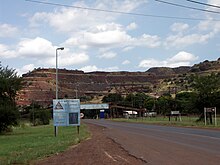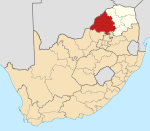Thabazimbi
This article includes a list of references, related reading, or external links, but its sources remain unclear because it lacks inline citations. (April 2009) |
Template:Infobox South African town Thabazimbi is an iron mining town in the Limpopo province of South Africa. The town is situated at the feet of the Ysterberg and is surrounded by the Witfonteinrand and Boshofberg with the majestic Kransberg in the background. The name Thabazimbi means mountain of iron because of the large iron ore reef that was discovered in 1919 by J.H. Williams. The mine boasts one of the largest mining shafts in Africa. More than 2 million tons of ore are mined every year and hauled by train to Mittal's iron and steel works. The railway line from Rustenburg reached the area in the 1930s and full scale iron and steel production began. The town was proclaimed in 1953. Kumba Iron Ore, previously Kumba Resources, is now the principal operator of the iron ore mine.

The Marakele National Park about 20 km north-east of the town and situated in the heart of Waterberg Mountains characterised by contrasting mountain landscapes, hills and valleys, as well a variety of wildlife. Marakele National Park is also the home of some of the Tuli Elephants that were caught up in controversy in 1999 involving animal cruelty in South Africa.
In the post-apartheid era, the town made headlines in 2003 as the site of Kamp Staaldraad, the Springboks' infamous training camp prior to the Rugby World Cup. The excesses of Kamp Staaldraad helped lead to an almost complete housecleaning of the upper administrative levels of South African rugby union.

